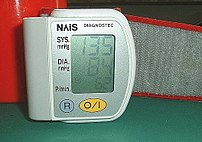6 Top Risk Factors for Heart Disease
Heart disease is a killer that does not discriminate between men and women or even the various cultures or socioeconomic backgrounds. Yes, it has even been called a universal killer because more people die from heart disease each year than other illnesses – several million a year worldwide! With some people, heart wellness is not even a blip on their radar because they don't even know anything about it! Others have a variety of health problems and know they are at greater risk than the average person for heart disease because of those problems. Some people take blood pressure medicine for much of their adult life.
Knowing what the risk factors are can greatly help in reducing your chances of developing heart disease. While there are likely dozens of contributing causes, there are six top risk factors for heart disease – with several that you can do something about. Here they are:
1. Hypertension – Also known as high blood pressure, hypertension is one of the leading contributors to heart disease. Why? Blood pressure basically is a measure of the force of the blood flow. The greater that force is, the more likely it is to cause problems, especially when other factors exist. The longer hypertension goes unchecked the more likely you are to develop hardening of the arteries, thickening of the heart muscle and much more. Exercise and diet can lower hypertension but sometimes medications are necessary to help.
2.Smoking – A nicotine habit can be life controlling. Smoking can promote the collection of fatty deposits in the blood which can lead to arterial blockage and heart disease. It also promotes narrowing of the arteries which requires the heart to pump harder to push oxygen through the body and results in hypertension.
3. Diabetes – This metabolic disease affects how insulin is produced and absorbed in the body. People with diabetes have a greater chance of developing several conditions that lead to heart disease such as narrowing of the arteries, arterial damage and hardening of the arteries. This condition can also affect the muscles, of which the heart is one of the most important ones.
4. High cholesterol – Cholesterol is important to the body as it is a necessary component for the healthy lining of body cells and blood vessels. You get cholesterol from foods as well as normal liver function. Even if you eat virtually no cholesterol, your body should be able to produce enough to adequately sustain healthy cells and blood vessels. Therefore, adding more cholesterol via the diet can boost cholesterol beyond normal limits in the blood. As this happens, plaque will build up along the arterial walls causing not only hardening of the arteries but also narrowing. This can contribute to heart problems by placing more burdens on the heart to get oxygen and nutrients to the body.
5. Obesity – Being hugely overweight contributes to a variety of other factors which in turn can develop into heart disease. Obesity means that you are likely to have higher cholesterol levels, problems with insulin production and absorption (diabetes issues) and more. When you lose the weight, less poundage removes some of the burden on your body and reduces heart disease risk.
6. Family genetics – Unfortunately, there is nothing you can do about family history and propensity towards heart disease. What you can change is how you live your life. A healthy diet low in fats and cholesterol and high in vitamins, minerals, antioxidants and other heart healthy substances can go a long way towards preventing the development of heart disease in you. Add clean living (no smoking or alcohol) and exercise and you have a winning trifecta against heart disease.
![Reblog this post [with Zemanta]](http://img.zemanta.com/reblog_e.png?x-id=820e225a-540d-4710-8eda-e9adc958241b)

![Reblog this post [with Zemanta]](http://img.zemanta.com/reblog_e.png?x-id=ac9dc324-bfbb-4a71-b1c1-0f5032c129d4)